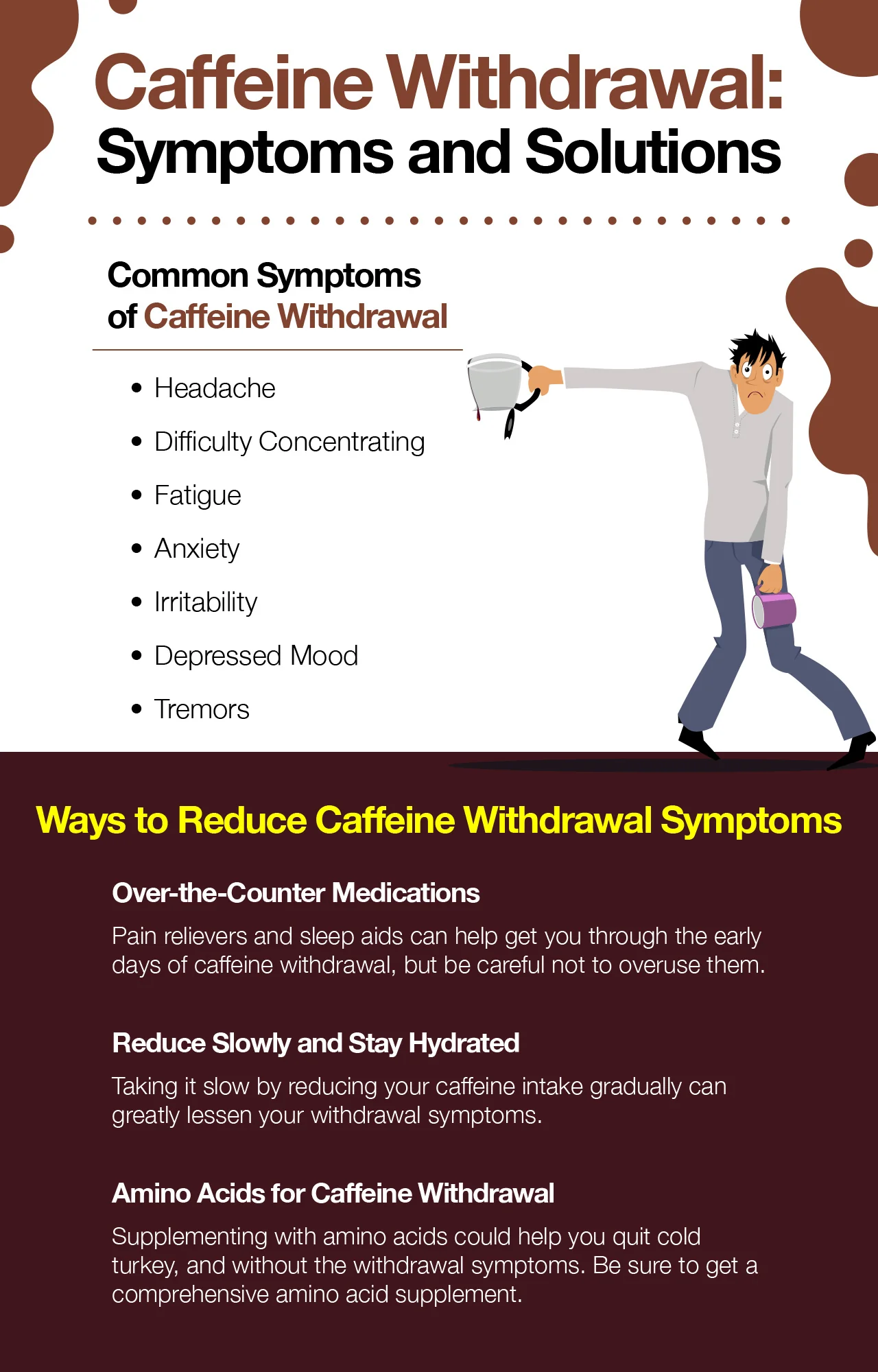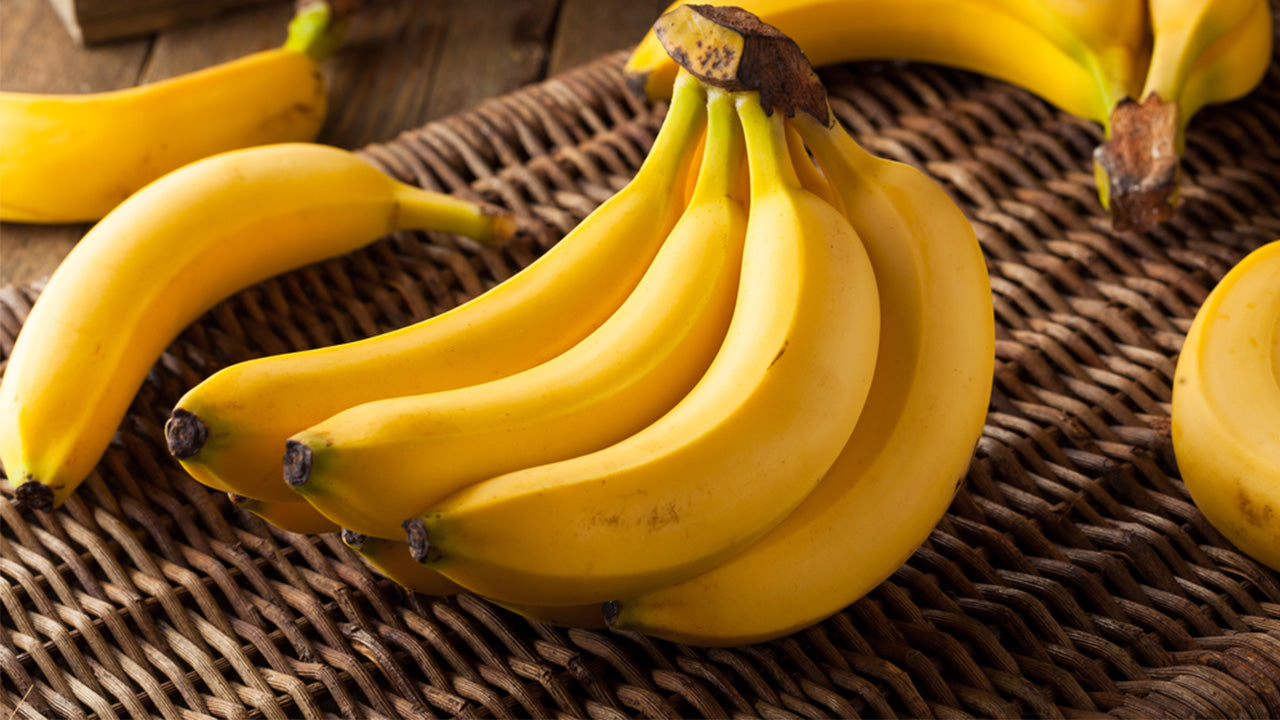Caffeine Withdrawal: Symptoms and Solutions
 By: by Amino Science
By: by Amino Science

If you've ever had a coffee or soda habit, you may have experienced caffeine withdrawal symptoms. They're uncomfortable, sometimes flu-like symptoms that can distract you from your work, disrupt your sleep, and make you irritable around your loved ones. Because coffee and soda are such normal beverages around the home and workplace, it can be easy to forget that caffeine, though mild, is still a drug just like any other. In fact, the American Psychiatric Association included "Caffeine Withdrawal" in a recent edition of the Diagnostic and Statistical Manual of Mental Disorders (the DSM-51), a publication for health care professionals that describes the criteria of mental disorders. Caffeine withdrawal causes real symptoms in the human body, and this article will describe some of those symptoms, and a few different methods you can use to relieve them.

Common Symptoms of Caffeine Withdrawal
Caffeine is a stimulant to the central nervous system, and it is also the world's most commonly used psychoactive substance. Caffeine affects your neural activity, increasing alertness and reducing fatigue. If you regularly consume caffeine your body begins to rely on it, and when you stop, you can experience withdrawal. Here is a list of some common symptoms of caffeine withdrawal.
1. Headache
One of the most commonly reported symptoms of caffeine withdrawal, headaches are caused because caffeine constricts blood vessels in the brain, slowing the blood flow. One study showed that those who consume fewer than 3 cups of coffee a day can reduce their cerebral blood flow by up to 27%. Once the blood vessels narrow, reducing your caffeine consumption allows the blood flow to increase to the brain again, which can cause painful, sometimes severe headaches as the brain readapts. The headaches will eventually subside, but read to the end of this article to find our suggested solutions for relieving the symptoms of caffeine withdrawal.
2. Difficulty Concentrating
Coffee, tea, and energy drinks with caffeine are often taken to boost concentration, so when you suddenly stop consuming them, that benefit ends. Caffeinated beverages are often used to improve focus before tests, athletic events, or presentations because caffeine causes your adrenal glands to up their production of adrenaline. Caffeine also boosts your excitatory neurotransmitters, norepinephrine and dopamine. Overall, caffeine works by raising your heart rate, your blood pressure, and stimulating your brain. Phasing out caffeine forces your body to suddenly adapt to doing without all those perks.
3. Fatigue
That feeling of tiredness you often use a cup of coffee to counteract? If you quit caffeine, that fatigue may return with a vengeance. Caffeine increases alertness by blocking adenosine receptors, a neurotransmitter that causes drowsiness. When that is removed from your body's chemistry, the adenosine comes right back, and affects you in a way you may have become unaccustomed to dealing with on your own.
One study of 213 habitual caffeine drinkers showed that abstaining from caffeine for only 16 hours caused feelings of fatigue. Those who consumed caffeine the most had much more severe withdrawal symptoms. Because the energy caffeine provides only lasts up to 4-6 hours, it becomes easy for normal users to get into the habit of drinking multiple cups of coffee or energy drinks each day, just to maintain their desired level of alertness. It also deepens their dependency.
4. Anxiety
Because caffeine is a stimulant that increases your blood pressure, heart rate, and the stress hormones epinephrine and cortisol, just 1 cup of coffee can make some people anxious and jittery. However, suddenly stopping your caffeine consumption can cause this side effect as well, as your body has become physically and mentally dependent on a substance it's no longer getting. Moreover if you take your caffeine in the form of soda or sweetened coffee you may be feeling the lack of sugar intake as well, which could amp up the restlessness and anxiety you feel and make your caffeine withdrawal even worse.
5. Irritability
Regular coffee drinkers are often cranky or irritable before their morning cup of java. It's a lack of caffeine that may be the cause of that, because caffeine only lasts in your system for 4-6 hours and it's worn off after a night's rest. As coffee drinkers are used to the mood-altering effects of caffeine, the lack of it can bring feelings of irritability. One study of 94 caffeine drinkers who wanted to cut back on their caffeine intake showed that 89% of the participants were unsuccessful, reportedly due to the symptoms of withdrawal, which included anger and irritability.
6. Depressed Mood
Caffeine is well known for perking people up and elevating their mood because it blocks adenosine receptors. Studies have shown that those who consume caffeine regularly have a more positive mood compared to those taking a placebo. It can go so far as to reduce the risk of depression, as seen in one study on over 50,000 women which found that those who drank 4 or more cups of coffee a day had a 20% lower risk of depression. Removing those benefits by ceasing caffeine consumption can cause a depression in mood, a side effect that could be quite dangerous, as depression is a serious condition that could alter someone's life for the worse.
7. Tremors
Another serious side effect of caffeine withdrawal: tremors. Those with a serious dependency may find their hands shake after they quit caffeine, because caffeine is a stimulant of the central nervous system. Quitting cold turkey could be ill advised for those with anxiety disorders or a long-term caffeine addiction, as these hand tremors could last between 2 and 9 days after stopping caffeine intake. Tremors lasting any longer than that may mean you need to consult a medical professional to make sure there isn't an underlying cause beyond consuming too much caffeine.
Ways to Reduce Caffeine Withdrawal Symptoms
Here are some tips for treating caffeine withdrawal symptoms.
1. Over-the-Counter Medications
For headaches or difficulty falling asleep, over-the-counter medications like pain relievers and sleep aids can help in the short term, to get you past those first few days of caffeine withdrawal. Ibuprofen (Advil), acetaminophen (Tylenol), and aspirin (Bayer) can help a caffeine withdrawal headache, but be sure to take them as instructed on the label, as some medications can cause stomach bleeding or kidney damage if overused.
2. Reduce Slowly and Stay Hydrated
Reducing your dependence on caffeine slowly is a way to minimize withdrawal symptoms while avoiding over-the-counter drugs. If you are drinking multiple cups of coffee a day, for example, you may want to take a month and reduce your caffeine consumption by 25% each week. That means 4 cups a day on a usual week should go down to 3 cups the next week, and so on until you can experience milder withdrawal symptoms. Switching to decaf or herbal tea after that can help you keep your habits and obey your taste cravings, and staying hydrated reduces instances of headache.
3. Amino Acids for Caffeine Withdrawal
Another option you might try is supplementing with the amino acid L-tyrosine for caffeine withdrawal (also known as tyrosine). Your brain synthesizes dopamine from tyrosine, which is normally gained from either high-protein food sources (cod, eggs, spirulina, beef, poultry, pork, dairy products, avocados, nuts, and seeds), or from another amino acid, phenylalanine.
The brain overproduces dopamine when you consume caffeine, first depleting your stores of tyrosine, then phenylalanine. When you stop caffeine consumption suddenly, your body may be unable to normally produce dopamine for a short time until it replenishes its amino acid stores.
Supplementing with a comprehensive amino acid supplement that includes tyrosine or phenylalanine (which helps restore both of them), could help you quit caffeine cold turkey, but without the cravings and withdrawal symptoms.
The last facet will be to replace the behaviors around caffeine consumption: heading to a coffee shop, having a soda as a midday pick-me-up, or relying on energy drinks when you need to focus. Replacing behavioral habits with new ones, and replacing your physiological dependence with the help of an amino acid supplement, may allow you to skip the backlash of removing daily caffeine from your life (and help keep you from backsliding into a habit you no longer want to participate in).
Remove Caffeine from Your Routine
Caffeine dependence is a very common predicament in the modern world. Most people are able to kick the habit on their own eventually, but relapsing is a common occurrence too. Consider using the tips above to stick to your new caffeine-free resolution, and consult a medical professional if you notice extreme withdrawal symptoms like double vision, confusion, or nausea, especially if they persist for longer than 9 days. Other than that, quitting caffeine is definitely doable, and you know you have the strength to see it through.

Up to 25% off Amino
Shop NowTAGS: food
Join the Community
Comments (0)
Most Craveable Recipes




 833-264-6620
833-264-6620



















